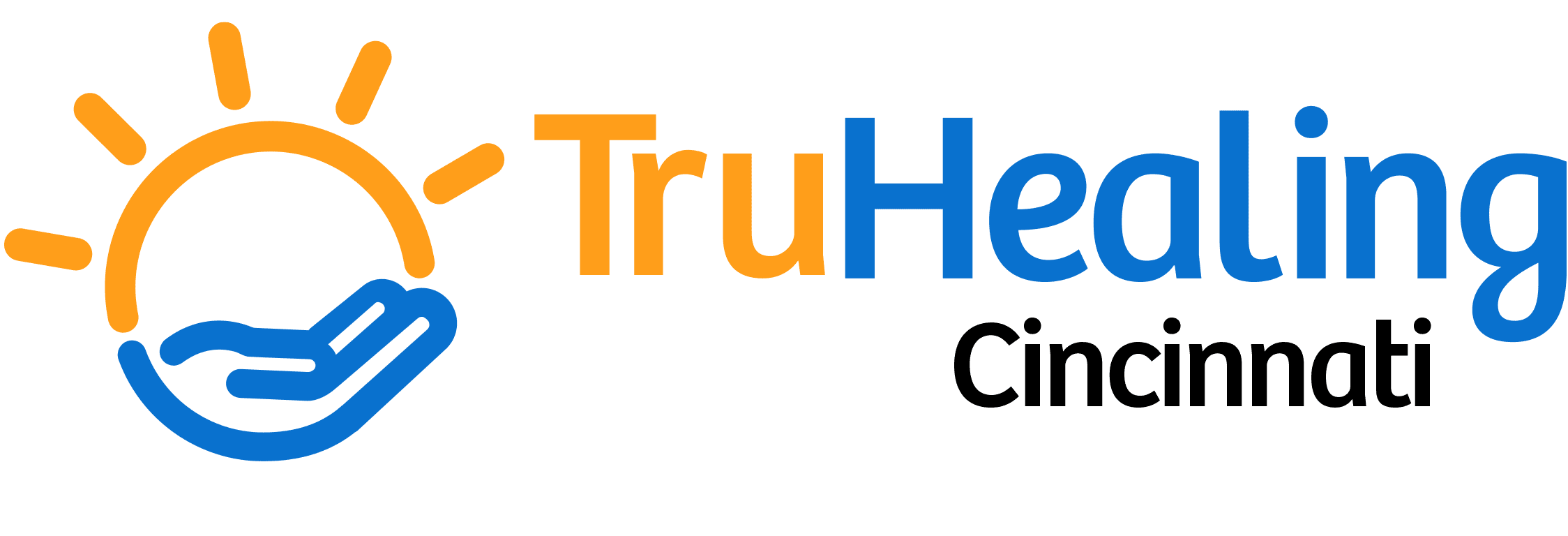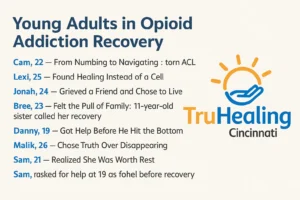Being young and sober can feel like standing outside in the rain while everyone else is partying inside.
You scroll your feed and see drinks, pills, blurry nights. You hear the jokes about getting “obliterated” this weekend. And part of you wonders if you’re the weird one. If you’re the only person your age who had to quit just to stay alive.
You’re not.
There are thousands of young adults quietly recovering from opioid addiction. Some in college. Some working three jobs. Some still figuring it out, one meeting or therapy session at a time. And their stories aren’t glamorous, but they’re real—and they matter.
At TruHealing Cincinnati, we’ve walked with countless young people who didn’t think they’d make it. Who didn’t think they deserved a second chance. This blog is for anyone who’s wondering if it’s possible to recover—and if recovery will ever feel normal.
Here are seven stories of young people who beat opioid addiction with the right support, the right treatment, and just enough willingness to start.
1. Cam, 22 — From Numbing to Navigating
Cam was a college athlete until a torn ACL ended his season—and opened the door to painkillers. What started as a prescription became a coping tool. For pressure. For family tension. For breakups. By the time he realized he had a problem, he was failing classes, skipping meals, and chasing pills between campuses.
After a close friend staged a conversation—not an intervention, just real talk—Cam agreed to a full evaluation and began treatment through our IOP (Intensive Outpatient Program). The turning point wasn’t dramatic. It was quiet. Just one night when he realized: “I don’t need to be numb to exist.”
Now, Cam mentors other student-athletes in recovery and says staying clean isn’t about perfection—it’s about presence.
2. Lexi, 25 — Found Healing Instead of a Cell
Lexi’s wake-up call came in orange.
After her third possession charge, the court offered a choice: jail time or residential treatment. She chose rehab—not because she believed it would work, but because she couldn’t imagine more time behind bars.
To her surprise, treatment wasn’t a lecture. It was a room full of people her age, dealing with the same chaos: self-worth issues, family drama, relationships built on using. Group therapy helped her unravel the mess—not shame it.
Lexi now leads harm-reduction workshops in Lexington, Kentucky and says she’s not in recovery to prove anything—just to protect her peace.
3. Jonah, 24 — Grieved a Friend and Chose to Live
Jonah and his best friend used together. Pills. Sometimes heroin. Nothing crazy, they told themselves. Then one night, fentanyl was in the mix. His friend didn’t wake up.
Jonah did.
The guilt almost consumed him. But instead of retreating, he asked for help.
He entered our residential opioid addiction treatment near Indianapolis, Indiana, stayed 60 days, and then transitioned to sober housing. He still cries for his friend sometimes—but now, he speaks at high schools about overdose prevention and the power of one hard choice.
4. Bree, 23 — Felt the Pull of Family
Bree’s addiction bloomed during the pandemic. Stress, isolation, the endless blur of bad news—she turned to oxycodone, then heroin, then fentanyl. Her parents didn’t know where she was half the time.
What brought her into treatment wasn’t an overdose. It was a phone call from her 11-year-old sister: “When are you coming home?”
That cracked her open.
She enrolled in a residential program close to Springfield, Ohio, cried through most of her first week, and stayed anyway. Today, she’s clean, rebuilding family trust, and coaching girls’ volleyball in her hometown.
5. Danny, 19 — Got Help Before He Hit the Bottom
Danny didn’t wait until the world fell apart. He noticed the shift early: skipping classes, sleeping too much, using pills just to be around people.
His mom noticed too. She gently brought up treatment—not because she thought he was “bad,” but because she wanted him to feel better.
Danny agreed, mostly to get her off his back. But in group therapy, something clicked. He realized he wasn’t broken—just stuck in patterns he didn’t know how to break.
Now, he’s two years sober and about to start EMT training. He says the best part of recovery is being able to show up—fully—for the people who matter.
6. Malik, 26 — Chose Truth Over Disappearing
Malik’s story is about more than addiction. It’s about identity.
He grew up in a conservative Ohio town, navigating life as a young Black queer man. Pills gave him an out. He could party. He could forget. He could feel less wrong.
But they also pulled him away from himself.
After a suicide attempt, Malik entered treatment with our trauma-informed care team in Cincinnati. It was the first time anyone asked him, “Who are you, without the mask?”
Today, Malik is out, proud, sober—and using his story to uplift LGBTQ+ youth in recovery.
7. Sam, 21 — Realized She Was Worth Rest
Sam didn’t look like someone in active addiction. On paper, she was thriving—grades, internships, social calendar on lock. But inside, she was unraveling.
She needed pills to sleep. Needed more to wake up. Needed something to silence the buzzing panic in her chest.
She told herself it was just burnout. Until a friend in recovery told her: “You’re not okay—and that’s okay. But you don’t have to stay here.”
Sam entered outpatient treatment and, for the first time, stopped trying to earn her rest. Now, she works in social work and says sobriety gave her back her softness.
The Truth About Recovery for Young Adults
These stories don’t all end with a trophy or a TED Talk. They end with stability, honesty, and the quiet, daily decision to stay alive and stay well.
Here’s what they all have in common:
- They didn’t know if treatment would work
- They were scared—sometimes angry, sometimes numb
- They thought they were too young to be “that bad”
- They all found something worth staying sober for
Opioid addiction treatment isn’t about becoming a “success story.” It’s about becoming a real person again—one who feels, struggles, connects, and grows.
Whether you’re from Cincinnati or searching for opioid addiction treatment near Lawrenceburg, Kentucky, we’re here for you. And no—you’re not the only one.
Frequently Asked Questions About Opioid Addiction Treatment
Do I have to go to rehab to get sober?
Not necessarily. Rehab can be a life-saving option, especially for those in deep crisis. But many young adults benefit from outpatient treatment, sober housing, therapy, or a combination. We’ll help you figure out what level of care fits best.
What if I’ve already tried treatment before?
Trying again doesn’t mean you failed. It means you’re still here—and that matters. Many people find the right fit only after a few attempts. We offer multiple paths, including trauma therapy, medication support, and community-based care.
I’m scared sobriety will make me boring. Is that normal?
Completely. A lot of young people use to feel confident, social, or creative. Recovery can feel awkward at first—but over time, most people say they rediscover themselves in deeper, more real ways.
How do I talk to my parents about getting help?
You don’t have to have the perfect words. You can start with, “I think I need help, but I’m scared.” That’s enough. If you need help navigating that conversation, our team can support you.
Is treatment private? Will my school or job find out?
All treatment at TruHealing Cincinnati is confidential. You control who knows. And we can work with schools or employers if documentation is needed for medical leave or protection under the law.
You’re Not the Only One—Even If It Feels That Way
If you’re reading this with your heart pounding, wondering if it’s too soon or too late or too complicated to get help—pause.
You’re not broken. You’re not alone. You’re not “the weird one.”
You’re just a young person trying to survive in a world that doesn’t always make it easy. But you don’t have to do it alone anymore.
Call (888) 643-9118 or visit our Opioid Addiction Treatment page in Cincinnati, Ohio to learn how we can support your next chapter—one story at a time.


